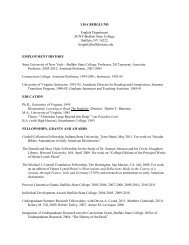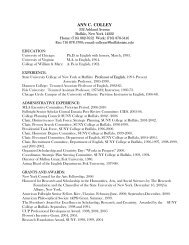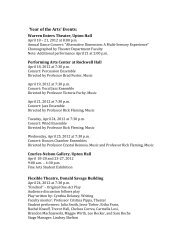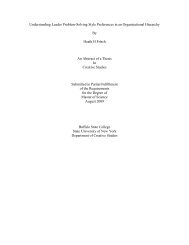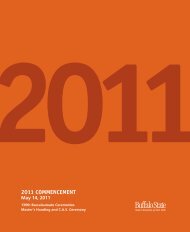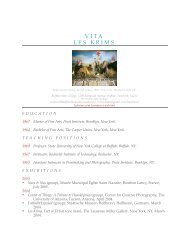POLITICS VERSUS SCIENCE: APPORTIONING ... - Buffalo State
POLITICS VERSUS SCIENCE: APPORTIONING ... - Buffalo State
POLITICS VERSUS SCIENCE: APPORTIONING ... - Buffalo State
You also want an ePaper? Increase the reach of your titles
YUMPU automatically turns print PDFs into web optimized ePapers that Google loves.
Wessels (1997, 36) attributes the proliferation of networks to the Commission’s<br />
failure to institute EU-wide corporatism, “The problem is thus not that the Brussels arena<br />
is a ‘closed shop,’ but that the new political space in which national and European<br />
institutions and groups compete is composed of complex and differentiated networks.”<br />
In an advisory (information) agency outside the comitology web, Dehoussee<br />
(1997, 247) sees the spate of agency creation “as part of an ongoing process of the<br />
deepening of European Community regulatory inventions.” Although the functions of<br />
the 15 agencies differ, some are informational, others executive, one regulatory (Kreher<br />
1997, 238), they share the mandate of establishing and maintaining policy networks<br />
among National Authorities, interests, and experts.<br />
Dehousse (1997, 259) reminds us that networks are the inevitable and paradoxical<br />
result of the EU’s need to “expand the scope of its influence in the administrative<br />
sphere…(while) greater centralization is politically inconceivable.” 24 But he adds:<br />
One may, of course, wonder how durable such a solution will be. The network<br />
approach certainly responds to important concerns, both political and functional,<br />
as the relevant expertise is generally at the national level. Like an institution,<br />
regulatory networks are likely to be subjected to contradictory pressures. Yet<br />
because they are loosely structured, (emphasis added) they may find it more<br />
difficult to give a coherent answer.<br />
Cosmopolitanism—the influential Habermas brand of postnationalism—predicts a<br />
diminishing role for states, pointing to the power international organizations now wield in<br />
setting standards for economic relations, in the respect and protection of human rights,<br />
democracy, and the rule of law. Europeans are weltbürger [world citizens] (Gottdiener,<br />
24 See Majone’s (1996a & b, 1999, 2000) earlier work in which he is favorable toward EU regulatory<br />
agencies, comparing the EU’s current concerns with those that led to the American administrative response<br />
of executive agencies with legislative oversight as the solution to market failure (rather than the European<br />
path of nationalization).<br />
27




